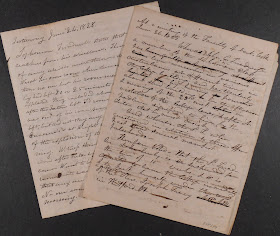 On June 23, 1828, John Treadwell of the Class of 1830 set off fireworks near Dartmouth Hall. That doesn't sound like that big of a deal but, in this circumstance, it was. On June 24th, a special meeting of the faculty was called to discuss his case and, on June 26th, the faculty meted out a ten-week suspension from Dartmouth.
On June 23, 1828, John Treadwell of the Class of 1830 set off fireworks near Dartmouth Hall. That doesn't sound like that big of a deal but, in this circumstance, it was. On June 24th, a special meeting of the faculty was called to discuss his case and, on June 26th, the faculty meted out a ten-week suspension from Dartmouth.We have a small clutch of hastily written notes from that week. It appears Treadwell had exhibited a pattern of bad behavior during his time at Dartmouth. The fireworks were merely the latest disturbance. It appears the faculty had had enough, and they interrogated Treadwell. During the meeting, he "stated several manifest falsehoods," as documented in notes and dispositions.
 He was banished to the "care and instructing of the Rev. Joseph Perry in Thetford, Vt." In October, Perry wrote a not-very-enthusiastic report to the faculty about young Treadwell's progress. While he had not "been altogether as industrious as would have been desirable and perhaps upon the strict principle might fall under the charge of some indiscretions," the good Reverend believes that Treadwell's former bad habits were likely the result of "unhappy connections."
He was banished to the "care and instructing of the Rev. Joseph Perry in Thetford, Vt." In October, Perry wrote a not-very-enthusiastic report to the faculty about young Treadwell's progress. While he had not "been altogether as industrious as would have been desirable and perhaps upon the strict principle might fall under the charge of some indiscretions," the good Reverend believes that Treadwell's former bad habits were likely the result of "unhappy connections." Hmmm--we are still not sure what all he did, but either the faculty opted not to readmit or he decided not to return: he never completed his degree.
To try to puzzle it out yourself, ask for MS 828374.


